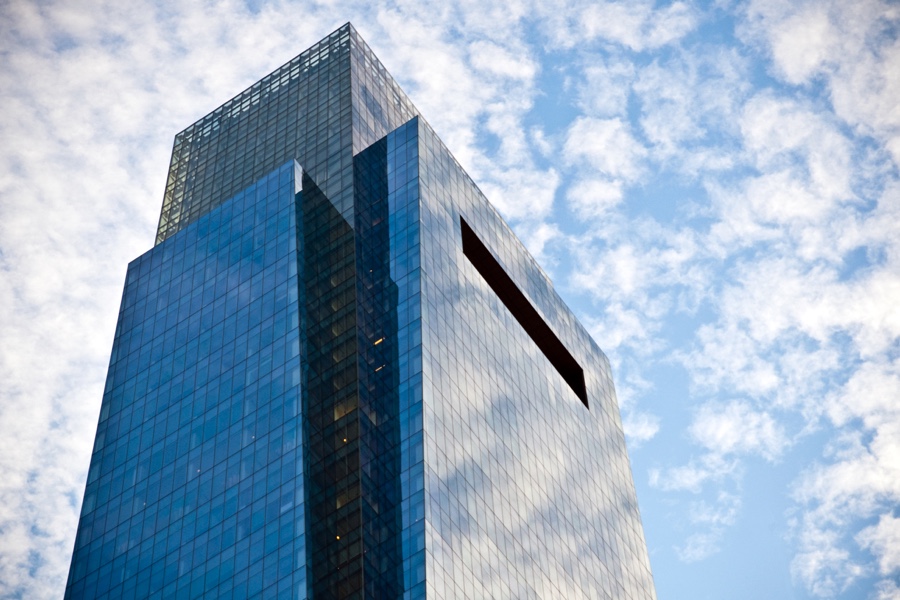Without Net Neutrality, We Can’t Trust Comcast to Do What’s Right
Media Mobilizing Project policy director Hannah Jane Sassaman explains how people can continue to fight for an Open Internet.

Comcast Center in Philadelphia, PA against clouds and a blue sky. andrewhuynh265 | iStock
While I and my organization have fought for an open and accountable media for years, I was delighted last week to show up at a net neutrality protest organized by ordinary people who know how important an open and free Internet is to them. On a busy December Thursday, one week before the Federal Communications Commission (FCC) was preparing to vote to dismantle net neutrality – also known as the core protections that have kept the internet open since its inception, over 200 people gathered at a random Verizon nestled into the brick facade of the Convention Center. Media Mobilizing Project has backstopped a bunch of protests for our right to communicate – primarily focused on our hometown monopoly Comcast and the pressure and power it exerts here, and around the country – but our only job with this self-organized event (thrown together as part of Team Internet’s VerizonProtests.com) was to bring some signs.
We showed up to a tightly gathered crowd passionate to defend net neutrality for dozens of deeply personal reasons. A young man spoke passionately about the importance of the internet for young people at risk of suicide. Two librarians spoke about how the death of net neutrality would rob the poorest Philadelphians of deeply needed content for school and work. Multiple libertarian speakers described the FCC-planned death of net neutrality as government overreach – a giveaway to Verizon, Comcast and AT&T. My favorite stories came from a young man named Gabe, a Drexel freshman who found a community of parkour enthusiasts online.
These people came out to fight for the Internet they needed and loved. They were part of 700-plus protests on the same day, where thousands of people in all 50 states stood up for the open internet – and millions upon millions more commented to the FCC, telling them to protect net neutrality and not dismantle it.
The day of the vote, 50+ of us loaded into a bus for DC, fortified by bagels and pro-net neutrality chants. One of them was Alex Wiles, a freelance filmmaker who spoke searingly at a packed FCC rally on how the internet has let him tell his stories, has fought racial injustice, and allowed him to build queer community in this world. He joined everyday people from rural Pennsylvania to Northern California.
The rush job Chairman Ajit Pai and his fellow Republicans did with the rule-making was riddled with improprieties. The Commission accepted millions of forged comments in favor of the corporate giveaway, and fully ignored thousands of net neutrality violation complaints.
In such an environment, we can’t trust that Comcast will protect our right to communicate without rules forcing them to do just that. So we’re back from Washington and ready to fight to keep the internet open for the poorest big city in America and beyond. Local communities have a big role to play. First, Congressional leaders have already moved to fully undo the horrible vote Ajit Pai’s FCC took on the 14th, with something called the Congressional Review Act – ask our Senators and House members to cosponsor it by visiting http://battleforthenet.com.
Second, state Attorneys General nationwide – including ours – are signing onto a lawsuit to sue the FCC over those fake comments – our Attorney General Shapiro estimates at least 100,000 Pennsylvanians’ names were fraudulently used to file pro-ISP, anti-net neutrality comments on the FCC’s rule-making on the issue.
Third, Philly already has led the nation in using our power over local telecoms – our franchise agreements – to force them to truly serve the city’s needs. We can explore using our local franchising power over Comcast or Verizon; push legislation locally or on the state level that says we won’t do business with Internet Service Providers (ISPs) unless they adhere to net neutrality; sanction companies that mislead consumers about speed, data caps, or prices; promote new ISP competitors and municipally owned ISPs that commit to net neutrality (as WA governor Jay Inslee is trying to do); or hold out offers of access to sweet, sweet city-deployed fiber or conduit to companies if they protect consumers’ rights to communicate.
Philadelphia City Council already took a big step in passing a strong resolution in support of net neutrality earlier this month. And many thousands have already expressed interest in a big, also totally self-organized protest at Comcast. We know that we need net neutrality in our bones. And we know that Comcast wants profit and power more than the rights of the people forced to use it to communicate. In the ways described above, those thousands, and policy experts here in Philly, in DC, and beyond, are ready to help our Congress, our Council and our Mayor protect our right to communicate now and for years to come.


